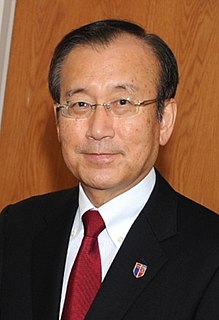A Quote by N. Scott Momaday
We are what we imagine. Our very existence consists in our imagination of ourselves. Our best destiny is to imagine, at least, completely, who and what, and that we are. The greatest tragedy that can befall us is to go unimagined.
Related Quotes
I celebrate myself," the poet Walt Whitman wrote. The thought is so delicious it is almost obscene. Imagine the joy that would come with celebrating the self — our achievements, our experiences, our existence. Imagine what it would be like to look into the mirror and say, as God taught us, "That's good.
We cannot and must not allow ourselves to have the message of Hiroshima and Nagasaki fade completely from our minds, and we cannot allow our vision or ideals to fade, either. For if we do, we have but one course left for us. And that flash of light will not only rob us of our vision, but it will rob us of our lives, our progeny, and our very existence.
Though we are commanded to 'wash ourselves', to 'cleanse ourselves from sins', to 'purge ourselves from all our iniquities', yet to imagine that we can do these things by our own efforts is to trample on the cross and grace of Jesus Christ. Whatever God works in us by his grace, he commands us to do as our duty. God works all in us and by us.
I think there is an American attitude that is very hard to break which is "We're great. Who wouldn't want to be like us? Who wouldn't want to have the benefits of our largesse, handing out aid and having American companies based in their countries?" and "our culture is great," and all that. It's hard for us to imagine ourselves as not being the greatest country on earth.
The storyteller is deep inside everyone of us. The story-maker is always with us. Let us suppose our world is attacked by war, by the horrors that we all of us easily imagine. Let us suppose floods wash through our cities, the seas rise . . . but the storyteller will be there, for it is our imaginations which shape us, keep us, create us - for good and for ill. It is our stories that will recreate us, when we are torn, hurt, even destroyed. It is the storyteller, the dream-maker, the myth-maker, that is our phoenix, that represents us at our best, and at our most creative.
Imagination is the politics of dreams; imagination turns every word into a bottle rocket. . . . Imagine every day is Independence Day and save us from traveling the river changed; save us from hitchhiking the long road home. Imagine an escape. Imagine that your own shadow on the wall is a perfect door. Imagine a song stronger than penicillin. Imagine a spring with water that mends broken bones. Imagine a drum which wraps itself around your heart. Imagine a story that puts wood in the fireplace.
There are studies that have shown that we make decisions, ethical and otherwise, based on the way we imagine ourselves as characters in the stories of our lives. In other words, if we imagine ourselves brave or crazy or open, we're more likely to make decisions in a given situation based on how we imagine ourselves, whatever the facts may be.
Let us fix our attention out of ourselves as much as possible; let us chase our imagination to the heavens, or to the utmost limits of the universe; we never really advance a step beyond ourselves, nor can conceive any kind of existence, but those perceptions, which have appeared in that narrow compass.
We see ourselves in other people’s eyes. It’s the nature of the human race; we are a species of reflection, hungry for it in every facet of our existence. Maybe that’s why vampires seem so monstrous to us—they cast no reflection. Parents, if they’re good ones, reflect the wonder of our existence and the success we can become. Friends, well chosen, show us pretty pictures of ourselves, and encourage us to grow into them. The Beast shows us the very worst in ourselves and makes us know it’s true .
When we respect ourselves, our lives change because the conflict in our mind ends. Then the relationship with our beloved also changes, and there will be peace in our family, in our friendships, in our community, and so on. Just imagine what kind of planet this would be if everybody respected themselves and everybody else?







































